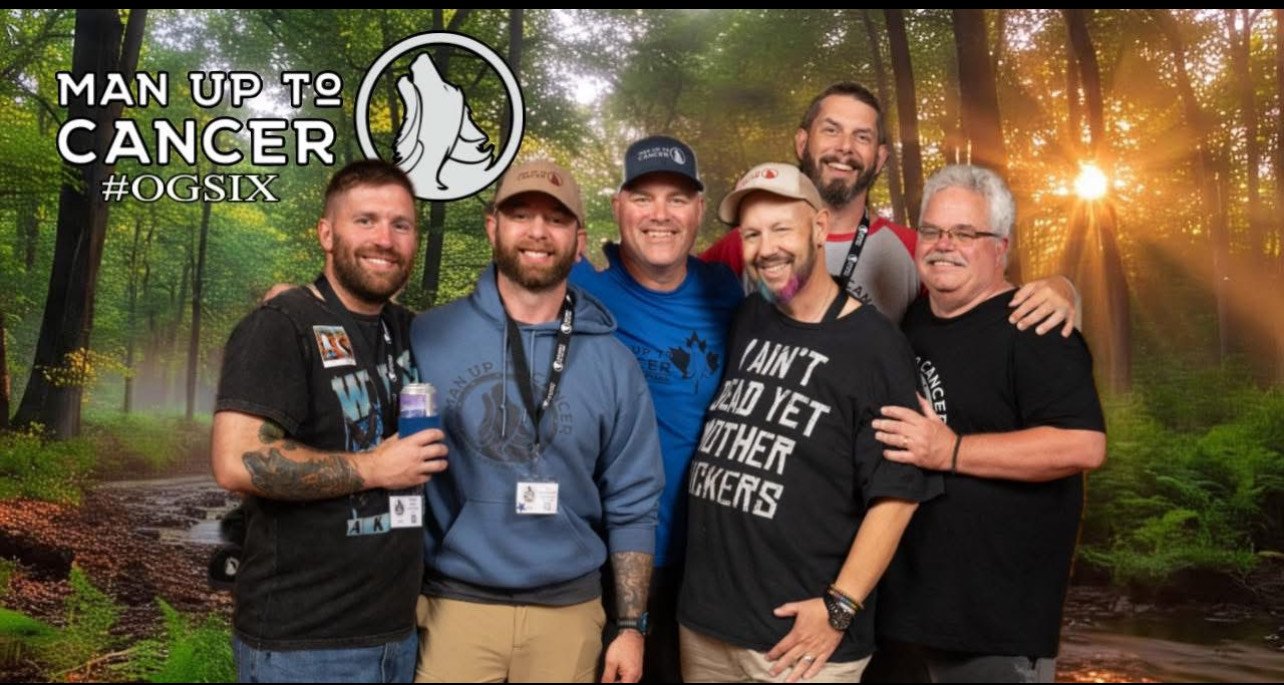Breaking the Silence: How Man Up to Cancer is Rewriting the Narrative for Men Facing Cancer
Written by Julie Woon, MSJ
This article was created from an episode of the YMyHealth podcast with co-host Julie Woon and colon cancer survivor Jay Abramovitch, Director of the Gathering of the Wolves at Man Up to Cancer.
Can you start by telling us what Man Up to Cancer is all about?
Jay: Man Up to Cancer is a grassroots organization focused on supporting men affected by cancer—whether they’re patients or caregivers. We don’t discriminate based on cancer type, stage, or where someone is in their journey. If you identify as a man and are 18 or older, we’re here for you. Our goal is to prevent isolation by fostering emotional support and community. Despite the name, “man up” here means asking for help when you need it.
You were diagnosed with stage three colon cancer at just 36, in the middle of the pandemic. What was that like?
It was surreal. I’d always been healthy, with no family history, so it was a shock. On top of that, the COVID lockdowns meant I went through almost everything alone. My wife was incredibly supportive, but physically, I was mostly on my own during treatment.
You’ve described yourself as one of the “forgotten ones” in the cancer community. What do you mean by that?
Being a younger man with a cancer often considered an “older person’s disease” left me feeling like an outlier. Most support spaces weren’t built for people like me. Man Up to Cancer filled a critical gap by creating a place where men—especially younger men—could find understanding and community.
How did you first discover Man Up to Cancer?
I was pointed there by others in the cancer community after reaching out for support. I was vulnerable and scared, and a few guys told me, “You’ve got to check this out.” Once I joined the private Facebook group, called The Howling Place, I knew I had found my people.
What makes The Howling Place unique among support groups?
It’s an emotionally focused space—no medical advice, no treatment talk—just emotional support from guys who get it. That makes it different and really powerful. Some guys are very active, others just read along. Everyone engages in the way that works for them.
Given that it started online, how has the organization fostered deeper connection?
We've grown a lot. Now we have three main programs: a chemo backpack initiative, a chapter network across North America and beyond, and the Gathering of the Wolves retreat. That’s our biggest event—a four-day in-person experience where men connect, share, and heal together.
What’s the story behind the Gathering of the Wolves retreat?
It started with Trevor Maxwell and a few core members who wanted to bring the online community together. It grew fast. I now run it, and we host up to 200 men annually in the Poconos. It’s like summer camp for grownups—fun, powerful, and healing. We also take time to honor those we've lost, which makes it even more meaningful.
What are some of the biggest challenges men face when dealing with cancer?
Mental health is a big one—depression, anxiety, PTSD, and medical trauma are common. There’s still stigma around men showing vulnerability, and that makes it hard to ask for help. Financial pressure is another, especially for younger men who haven’t had time to build up savings or careers before being diagnosed.
Jay Abramovitch, Director of the Gathering of the Wolves at Man Up to Cancer.
What should the healthcare system do differently when it comes to men and cancer?
There needs to be more male representation in the cancer care space—not just doctors, but social workers, group leaders, and support personnel. It also has to be okay for men to share their perspectives openly and feel heard.
How can loved ones encourage men to seek help without pushing them away?
It’s a delicate balance. Sometimes pushing too hard causes resistance. That’s why male-specific spaces help—seeing other guys open up makes it easier. Being gently persistent and offering choices is key.
What’s next for Man Up to Cancer?
We recently became a nonprofit and launched our own platform on Circle, independent from Facebook. We’ve also just hired our first CEO. This growth allows us to reach even more men who might otherwise be isolated.
What advice would you give to a man newly diagnosed with cancer?
Don’t try to do it alone. Whether it’s Man Up to Cancer, a therapist, a friend, or another support group—reach out. Vulnerability is strength, and community changes the experience.
How has this journey changed your view of strength and masculinity?
It’s shown me that real strength is being open and honest about what you’re feeling. Some days I’m the one giving support, and others I need it. And that’s okay. I’ve learned that you don’t have to fix everything yourself.
Is there anything you want to add before we wrap up?
Yes—if something feels off, advocate for yourself. Early-onset cancer is rising, especially colon cancer, and we need to push for earlier screening and more research. Don't take no for an answer. Keep pushing until someone listens.
If you’d like to learn more about Man Up to Cancer, visit manuptocancer.org. You can join the Wolf Pack, access the support platform, and learn about our programs, retreats, and how to get involved.
Want to hear more from Jay about Man Up to Cancer? Check out the YMyHealth podcast!


